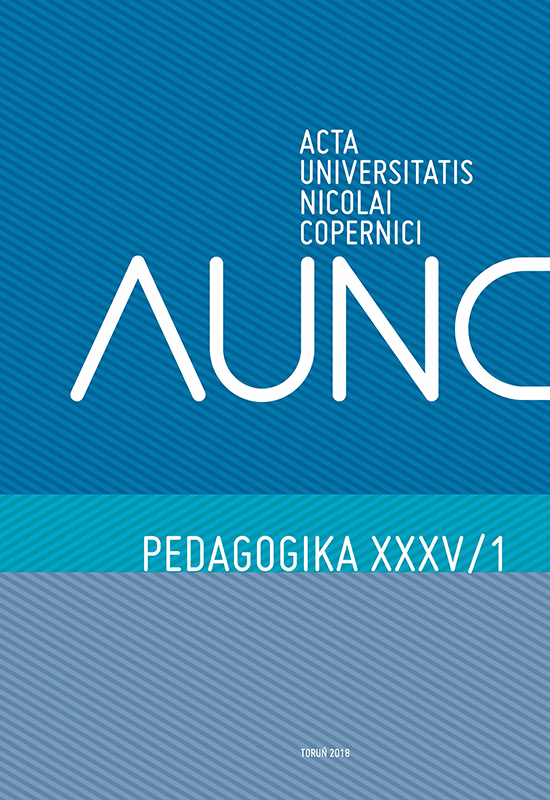Forward, Polonia! A Review of Online Educational Initiatives for Polish Diaspora
DOI:
https://doi.org/10.12775/AUNC_PED.2018.010Keywords
Polish diaspora, education, Internet sourcesAbstract
This is an overview article. It presents examples of Internet support for Polish diaspora education, and the promotion of Poland and Polish culture through free access to Internet sources, including open educational resources and e- learning courses. The starting point of this review is therefore to understand the problems of the Polish diaspora and the need to develop an educational offer that takes into account educational and socio-cultural needs of Polish diaspora. The initiative undertaken may also be used to strengthen the activities of Polish scientific departments at foreign universities, schools, consultation centres, teachers, and Polish diaspora organisations that, with their hard work and personal commitment, care for Polish culture, tradition, language and national values abroad, while requiring support from the Polish government and educational institutions, as well as from academia.
References
Biblioteka internetowa Wolne lektury, https://wolnelektury.pl/info/o-projekcie/ [dostęp: 2-0.03.2017].
Dyczewski, Leon. Kultura w całościowym planie rozwoju. Warszawa: Instytut Wydawniczy Pax, 2011.
Historia dla dzieci, http://historiadladzieci.pl/o-projekcie.html [dostęp: 22.03.2017].
Historia dla Polonii, http://www.historiadlapolonii.pl/ [dostęp: 26.06.2017].
Instytut Pamięci Narodowej, Portale-Pamięć.pl, https://ipn.gov.pl/pl/edukacja-1/portale/33352,Pamiecpl.html [dostęp: 22.03.2017].
Kwiatkowska, Wioletta, Majewska, Kamila, Skibińska, Małgorzata. “Pedagogika medialna na Uniwersytecie Mikołaja Kopernika w Toruniu jako przykład studiów stacjonarnych w formie online”, E-mentor 1(68) (2017), http://www.e-mentor.edu.pl/artykul/index/numer/68/id/1288/ [dostęp: 26.06.2017].
Majewska, Kamila. “Multimedialne gry dydaktyczne w opinii studentów edukacji wczesnoszkolnej”. In: Lifelong Learning, ed. Violetta Tanaś, Wojciech Welskop, p. 169–176. Łódź: Wydawnictwo Naukowe Wyższej Szkoły Biznesu i Nauk o Zdrowiu, 2015.
Mapa Otwartych Zasobów Edukacyjnych, https://men.gov.pl/wp-content/ uploads/2013/07/mapa_oze.pdf [dostęp: 17.01.2017]
Nasza szkoła – darmowe podręczniki dla kl. I–III, https://naszelementarz.men. gov.pl/category/dla-nauczycieli/ [dostęp: 2-0.03.2017]
Ninateka, http://ninateka.pl/strona/jak-korzystac [dostęp: 22.03.2017].
Ośrodek Rozwoju Polskiej Edukacji za Granicą (ORPEG), http://www.orpeg.pl/ index.php/home/o-orpeg [dostęp: 26.06.2017].
Pietras, Tomasz. Wirtualne Muzeum Orła Białego, http://orzelbialy.edu.pl/ blog/ [dostęp: 22.03.2017].
Podręcznik internetowy. Włącz Polskę, http://wlaczpolske.pl/index.php?etap=10&i=762 [dostęp: 2-0.03.2017].
Polski Uniwersytet Wirtualny, http://www.puw.pl/ [dostęp: 26.06.2017].
Polskie Szkoły Internetowe Libratus, https://www.libratus.edu.pl/ [dostęp: 26.06.2017].
Polskie szkoły internetowe... ale w przeważającej mierze nie w Polsce, czyli edukacja domowa dla emigracji, http://sliwerski-pedagog.blogspot.com/2016/01/ polskie-szkoy-internetowe-ale-nie-w.html [dostęp: 26.06.2017].
Portal Edukacyjny Uniwersytetu Mikołaja Kopernika, http://portal.umk.pl/ [dostęp: 26.06.2017].
Portal historyczny polishhistory.pl, http://www.polishhistory.pl/index.php?id=97[dostęp: 22.03.2017].
Sękowska, Elżbieta. Język emigracji polskiej w świecie: Bilans i perspektywy badawcze. Kraków: Wydawnictwo UJ, 2010.
Downloads
Published
How to Cite
Issue
Section
Stats
Number of views and downloads: 884
Number of citations: 0



